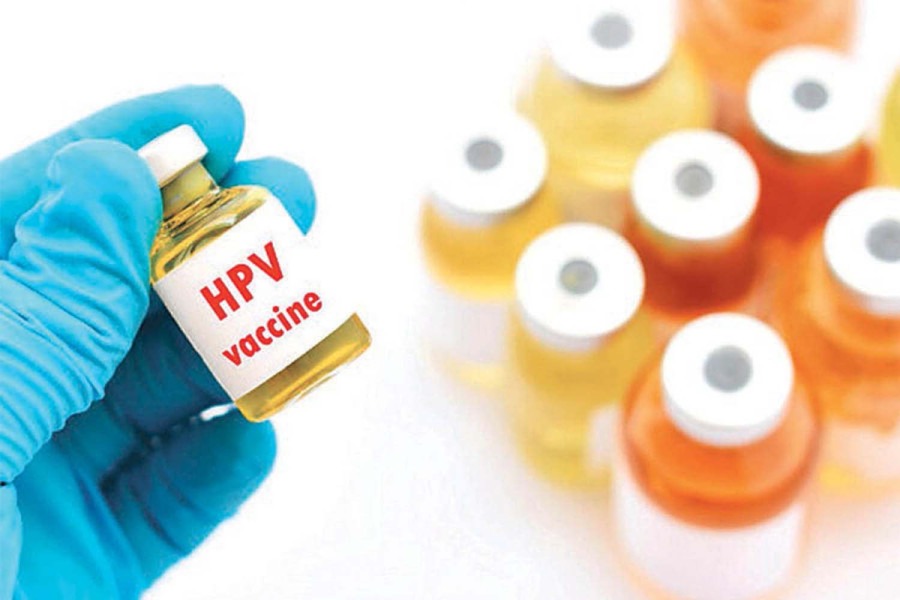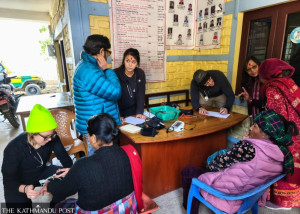Health
School dropout girls, anti-vaxxers key challenges to upcoming HPV drive
An estimated around 160,000 girls between 11 and 14 years are out of school, mostly in Madhesh Province.
Post Report
Thousands of school dropout girls between 11 and 14 years, and anti-vaxxers who have been spreading rumours are the main challenges for the success of the upcoming vaccination drive scheduled to start from February 4.
Officials at the Ministry of Health and Population estimated that around 10 percent of the targeted girls are out of school, which is up to 160,000 in numbers.
“We are aware of girls who have dropped out of schools and are quite vulnerable to missing the vaccination,” said Dr Abhiyan Gautam, chief of the Immunisation Section at the Family Welfare Division of the Department of Health Services. “Some anti-vaxxers, who have been spreading rumours, also pose challenges to the planned vaccination drive.”
Human papillomavirus is a viral infection that spreads through skin-to-skin contact and is a leading cause of cervical cancer—the second-most common cancer in the developing world. It is a major cause of deaths among Nepali women, with hundreds diagnosed with cervical cancer in Nepal every year.
The Ministry of Health and Population said it is all prepared to inoculate girls between 10 and 14 years of age with a single dose of the human papillomavirus (HPV) vaccine during a nationwide vaccination drive scheduled to kick off next on Tuesday.
Gautam says he does not have detailed data on girls between 11 and 14 who dropped out of schools but estimated them to number around 10 percent of targeted groups. He said that district health offices have been sending the estimated data of dropout girls of the said age group, and it is estimated that districts of Madhesh Province have a high number of girls dropping out of schools.
“To find the whereabouts of girls quitting schools is really a challenge to the health workers,” said Gautam. “We have alerted health workers accordingly. Apart from this, some anti-vaxxers are creating challenges by spreading rumours against the vaccine’s safety. We would like to request everyone not to rely on those rumours.”
During the two-week-long campaign that will continue until February 18, a total of 16,88,768 girls in the age group will be inoculated.
Officials said that 18,900 schools from across the country had been designated as vaccination centres. The vaccine dose will be administered from 8,200 health facilities additionally.
Over 27,000 health workers and more than 54,000 female community health volunteers (FCHVs) will be deployed for the campaign.
The health ministry said that it has already supplied vaccine doses to the districts. The Global Alliance for Vaccine and Immunisation (GAVI) supplied 1,770,400 vaccine doses. The alliance has also provided funds to cover the campaign's operational costs, officials say.
The exact number of patients suffering from cervical cancer is not known, but it is estimated that every day, at least four women die of cervical cancer in Nepal.
BP Koirala Memorial Cancer Hospital in Bharatpur said that more than 700 women suffering from cervical cancer seek treatment at the hospital every year.
Experts say early treatment can prevent up to 80 percent of cervical cancer cases.
The government has appointed renowned Bollywood actress Manisha Koirala as the Goodwill Ambassador for the HPV vaccination campaign. Koirala, who is a cancer survivor, will help in raising awareness about the importance of the HPV vaccine.
Countries like Bhutan, Sri Lanka, Thailand and the Maldives have introduced HPV vaccines nationwide, while India and Indonesia have introduced them in select districts.
Last year, Nepal purchased 20,000 doses of the HPV vaccine and administered them to around 9,000 girls aged between 14 and 15 years in all seven provinces. Two doses of the HPV vaccine were administered within a six-month period.
The government has decided to include the HPV vaccine in the routine immunisation list following the compilation of the nationwide drive.
It is estimated that there are around 350,000 girls aged 10 years who will be jabbed with the HPV vaccine.
Nepal will need to cover a certain percentage of the cost of the vaccine once it is included in the regular immunisation list, officials say.
The UN health body says HPV vaccination is recommended as part of a coordinated strategy to prevent cervical cancer and other diseases caused by the virus.
Meanwhile, the health ministry said that USAID’s assistance in the planned vaccination drive was halted due to the US government's recent decision to suspend all foreign aid for 90 days.




 10.12°C Kathmandu
10.12°C Kathmandu













